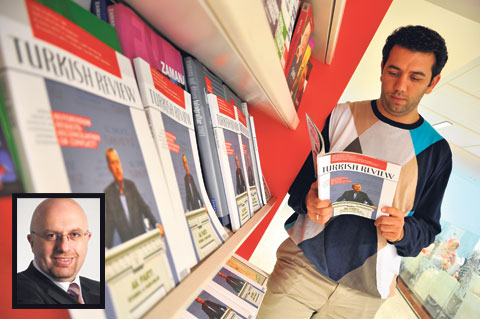Turkish Review, a bimonthly journal that positions itself at the intersection of academic and general consumer markets, has begun its publication life in order to meet the increasing global interest in understanding domestic issues in Turkey and the Turkish approach to world affairs due to the growing importance and influence of Turkey not only in its region but also around the world.The journal’s 128-page first issue took its place on the shelves at newsagents yesterday but it has already met
with a notable interest around the world as a result of efforts that intensified particularly after its zero issue was published a couple of months ago for consultations with Turkish and foreign experts. Editor-in-Chief Kerim Balcı says they aim to reach 3,000 print subscriptions from abroad by the end of their first year of publication and seek to have a presence primarily in the US and Europe, which he says are the locations where “ideas are created and developed.â€
In an interview with Today’s Zaman, Balcı explained their targets and what kind of a gap the Turkish Review will fill with its editorial approach and publication quality.
“It is a review journal with a blend of academic and journalistic approaches. So, we will provide our readers with a review of political and economic developments in Turkey and abroad in every issue we publish,†he said, adding that it will be the first of its kind in Turkey and should be the “memory of the country†in the future. Explaining why they did not opt for fully an academic or journalistic approach, he argued that neither academics nor journalists will be able to maintain the grounds they have worked on in the future if they do not adapt the conventional ways of exercising their professions to the needs of the post-modern era. “The academic formation is changing in the world now. An academic can no longer find an area of intellectual survival if he or she does not write for a newspaper or talk on a TV station. I think it is a necessity of the post-modern era to have a screen. Likewise, the journalists who ignore the challenges posed by TVs, online news portals and blogs and try to publish their newspapers in conventional methods will also vanish. For me, the intellectual profile of the future is semi-academic and semi-journalistic people, exactly like the ones who write for Turkish Review,†he noted.
Blending both the academic and journalistic approaches, the TR provides readers with in-depth analysis of Turkey’s domestic issues and the Turkish interpretation of world affairs. Kerim Balcı (inset)
Balcı summarizes what they aim to do at TR as “becoming a venue for the right and strong authors to reach out to the right and strong readers.†Elaborating on this aim, he further argued that they want influential articles that will result in a paradigm shift to appear on the journal’s pages. “Take for example the article [Samuel] Huntington wrote: “Clash of Civilizations,†which was published in the Foreign Affairs journal in 1993. That particular article caused us 15 years of debate and changed the paradigm. The scholars in the West are still dealing with it. Another example is [Francis] Fukuyama’s “The End of History and the Last Man.†It was first published as an article, too. I want similar articles that will change the paradigm on the perception of Turkish politics and approach to international issues to be published in Turkish Review as well,†he said.
Balcı also argued that one of their aims is to introduce brilliant Turkish academics and journalists to the entire world of intellectuals. For him, those very talented Turkish nationals are currently little known because so far they were not offered the opportunity to address an international, well-educated and receptive audience. “In the last 20 years, Turkey has brought up great minds but they are not known. We also aim to be a platform to expose them to world-class professionals. We want to reach a level where their articles at the Turkish Review will be a remarkable reference for pundits, proving their expertise in their fields to the world,†he explained, stressing that the interest in the journal may be much beyond expectations as the interest in understanding Turkey and the Turkish approach to international matters has surprised a lot of authorities around the world. Turkey’s reenergized foreign policy, which has adopted the “zero problems and maximum trade†strategy, and its rapidly growing economy particularly has in the last decade persuaded many scholars and observers to examine the country more thoroughly. Continuing the accession negotiations with the European Union for the last five years, Turkey was also elected to the UN Security Council for two years in late 2008. It has improved its relations with all its neighbors and mutually lifted visas with a number of them including Syria, Libya and Russia. Furthermore, its economy grew at an average of over 4 percent between 2002 and 2009; in the first half of this year it sealed this economic success by recording 11 percent growth.
Second issue to be on Turkey-EU relations
For cover stories, the journal will organize debates where experts will discuss a certain subject at a round table meeting. The first issue’s cover story was on the results of the last month’s referendum where people overwhelmingly approved a set of constitutional amendments. The meeting for the first cover story was attended by representatives of different ideologies and approaches. Among them were main opposition Republican People’s Party (CHP) deputy Mehmet Sevigen, Kurdish intellectual Ümit Fırat, sociologist Fatma Karabıyık Barbarosoğlu, Turkish-Armenian writer and Taraf daily columnist Markar Esayan and Aksiyon newsweekly executive director Bülent Korucu. Balcı said they will always preserve this pluralistic approach and try reflect all kinds of different ideas about the subjects they will have for their cover stories in the future too. He also said the cover story for the second issue will be about Turkey-EU relations and the country’s bid to join the 27-nation bloc in particular. The topic will be discussed by leading experts and scholars in the field at a similar round-table meeting. By the time the second issue will be published in December, the European Commission’s 2010 progress report on Turkey will also have been released.
The journal’s first issue, which recently was presented to the market, will also be sent to 1,300 libraries of the world’s leading 600 universities and Balcı says they expect half of them to subscribe to the journal. TR can be delivered to all countries in the world and also offers readers the option to subscribe to its online edition. Some select articles and interviews can be viewed free of charge on the website: www.turkishreview.org.
Source: MUSTAFA EDIB YILMAZwww.todayszaman.com




